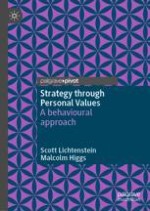2022 | OriginalPaper | Buchkapitel
3. Developing Strategy Based on Personal Values
verfasst von : Scott Lichtenstein, Malcolm Higgs
Erschienen in: Strategy through Personal Values
Aktivieren Sie unsere intelligente Suche, um passende Fachinhalte oder Patente zu finden.
Wählen Sie Textabschnitte aus um mit Künstlicher Intelligenz passenden Patente zu finden. powered by
Markieren Sie Textabschnitte, um KI-gestützt weitere passende Inhalte zu finden. powered by
